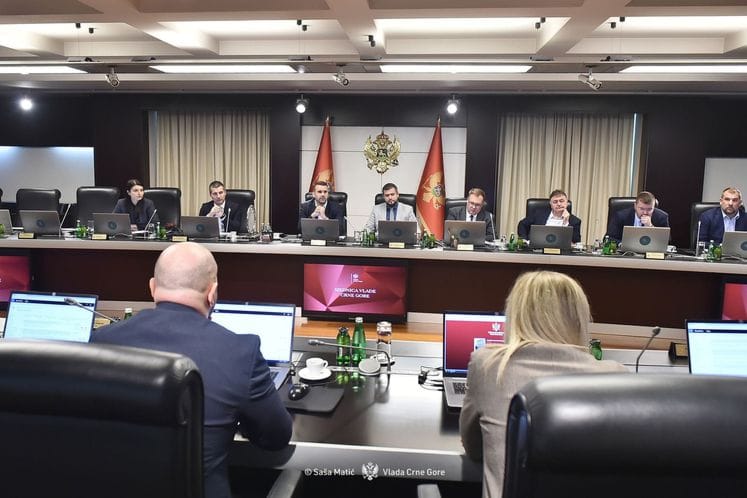- Government of Montenegro
Press release from the 52nd Cabinet session
Press release from the 52nd Cabinet session

At today's 52nd session, chaired by Prime Minister Milojko Spajić, the Montenegrin Cabinet adopted the Information on the results of negotiations and the conclusion of a Framework Agreement with the French Development Agency (AFD) regarding the Development Policy Loan. The Framework Agreement and the Draft contract were approved. The Framework Agreement defines the conditions and principles of future cooperation between the lender and the borrower. It does not obligate the lender to approve credit lines but provides the possibility of granting loans, depending on the fulfillment of all defined conditions and procedures. Under this agreement, there is the potential for two loans: the first DPL loan in 2024, amounting to €50 million, and the second DPL loan in 2025, also amounting to €50 million. During official negotiations with representatives of the French Development Agency, the terms were set, including a total loan arrangement of €50 million, with a repayment period of 10 years and a planned grace period of 18 months. Repayment will be made semi-annually, starting on 30 April 2026, with the final repayment date being 30 October 2034. The interest rate will be determined at the time of fund withdrawal, and the Ministry of Finance will choose between a fixed or variable interest rate, depending on the offered terms. In the case of a variable interest rate, it will consist of the six-month EURIBOR, increased by a fixed margin of 0.8%. The Information reminds that Development Policy Loans are financial instruments provided by international financial institutions, such as the World Bank, to support countries in implementing political and institutional reforms. The goal of these loans is to help countries implement structural changes that will stimulate economic growth and reduce poverty. The funds from the French Development Agency represent part of the support for development policies.
The Cabinet adopted the Information on activities related to the implementation of renewable energy projects. It was highlighted that Montenegro, as a member of the Energy Community and a candidate for EU membership, fulfilled the obligation to align its energy policy with the European Union's energy policy. It transposed and implemented Directive (EU) 2018/2001 on the promotion of renewable energy use. The Directive sets a target for the share of renewable energy in total energy consumption by 2030, which for Montenegro is set at 50%. This Directive was transposed into the Law on the Use of Renewable Energy, adopted by the Montenegrin Parliament on 17 August 2024. By adopting this law, Montenegro made a significant step forward in aligning with EU regulations, which is crucial for closing Chapter 15 – Energy in the EU accession negotiations. Regarding the construction of small hydropower plants, it was reported that 29 concession agreements are currently active, allowing for the construction and exploitation of 42 small hydropower plants (SHPPs), of which 33 have been completed. The total installed capacity of these SHPPs is 52.6 MW, with planned production of 182.4 GWh. Given the numerous inherited issues from the previous period in the implementation of SHPP concession agreements, the Ministry assessed that each case must be thoroughly examined, and appropriate long-term solutions must be found.
The Cabinet adopted a decision to allow the sale of standing timber from state-owned forests in the areas of Rožaje, Plav, Pljevlja, and Berane (sanitary logging in 2024). This decision pertains to timber volume exposed to entomological and other abiotic factors. The sale will be conducted through public auctions, with the initial price determined based on the quality of the designated timber and other parameters defined by the Forest Law.
The Cabinet approved the basis for negotiations and the conclusion of an agreement on access to higher education and admission to studies in the Western Balkans, along with the proposed agreement. This agreement provides the legal framework for regulating access to higher education and the admission of students to accredited public higher education institutions in the signatory countries. Rights to free education, accommodation, and scholarships will be regulated in accordance with each country’s legislative framework. The signing of this agreement will improve existing ties between the Western Balkan countries and enhance mutual cooperation in education.
The Cabinet adopted the Information on the state of the environment in Montenegro for 2023, covering various aspects such as air quality, climate change, water, marine ecosystems, waste management, and biodiversity, among others.
The Cabinet adopted the Decree on the fee that sellers must pay for lightweight plastic carrier bags thicker than 50 microns. The fee will be €0.03 per bag and will be calculated based on monthly reports on the quantity of bags sold. This regulation aims to reduce the use of plastic bags and improve waste management, thus minimizing the negative impact on the environment and human health.
The Cabinet adopted the Information regarding the second phase of the tender for the concession project for Montenegro's airports. It was noted that due to organisational changes in state administration, a new decision was made to reconstitute the Tender Commission for the concession process for the use of Podgorica and Tivat airports.
The Cabinet approved the basis for negotiations and the conclusion of a Memorandum of Understanding between the Government of Montenegro and the Government of the United States of America on economic cooperation, accepting the draft of the memorandum. It was noted that the Memorandum will enable the intensification of cooperation in mutually beneficial economic areas, such as infrastructure, IT, energy, transport, and tourism, as well as strengthening bilateral cooperation in the areas of technology, cyber security, health, environmental protection, and resource management. The memorandum is based on strengthening the business environment and institutional frameworks, with special support for entrepreneurship and a transparent regulatory regime.

